Hundreds Of Activists Ask 5 Political Prisoners In Iran To End Hunger Strike
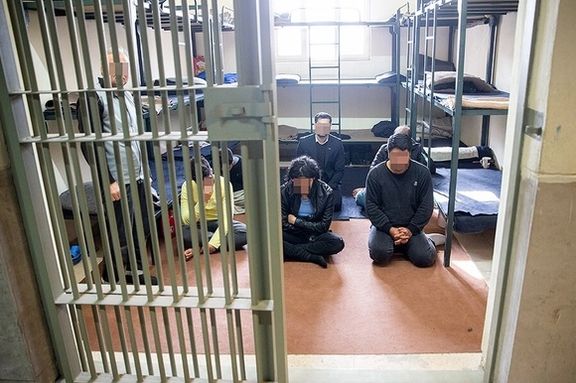
Hundreds of rights activists have asked five political prisoners held by the Islamic Republic to end their month-long hunger strike.

Hundreds of rights activists have asked five political prisoners held by the Islamic Republic to end their month-long hunger strike.
In a letter 650 activists said the hunger strike has raised awareness about the conditions of the Iranian prisoners of conscience and garnered support by many human rights organizations from inside and outside of Iran.
The letter urged the prisoners to end their strikes as reports indicate their health is deteriorating.
Shakila Monfared is being held in Qarchak Prison, also known as Rey Women Prison, while Hamid Haj-Jafar Kashani, Sina Beheshti, Mohammad Abolhasani, and Saeed Tamjidi are in Great Tehran Penitentiary, aka Fashafuyeh.
They started their hunger strike four weeks ago to protest neglect by prison authorities and the death of poet and political prisoner Baktash Abtin, who succumbed to Covid-19 complications after he was denied timely treatment by officials at Tehran’s notorious Evin prison.
Tamjidi, one of the prisoners who was arrested during the November 2019 nationwide protests, along with his fellow hunger-striking prisoners, was beaten by guards and medical staff when they were feeling sick and taken to the prison infirmary in late January.
Earlier in January, a young political prisoner, Adel Kianpour, who was on hunger strike to demand a fair trial died in detention without receiving any medical care in the Sheiban prison in the southwestern city of Ahvaz in Khuzestan province.

A hacktivist group has released footage from closed-circuit cameras in an Iranian prison to prove it hacked the security system of the detention center.
Hacktivist group Edalat-e Ali (Ali's Justice) sent the videos along with some files and classified prison documents to Iran International on Monday to prove they also hacked the computers of Ghezel Heassar prison located in the city of Karaj some 20 kilometers northwest of the capital Tehran.
The video shows security guards' reactions as their camera feeds were being cut off.
The documents received by Iran International include a list of hundreds of prisoners who were arrested during the November 2019 protests and their charges.
Many were sentenced to long term prison sentences and lashes on charges such as taking photos from the protests, parking their cars where the protests were held, having PDF version of forbidden books in their phones, or shouting slogans against the leaders of the Islamic Republic.
Another document, attributed to the judiciary and signed by Tehran’s deputy prosecutor Mir-Mostafa Seyyed-Ashrafi, was about proposed strategies to counter trials and tribunals about Iran’s human rights violations that were held in Europe, including the Netherlands, Sweden, and the UK.
The document contained details about the Stockholm trial of Hamid Nouri (Noury) as a judge and torturer in the 1988 wave of prison executions, and the Iran Tribunal about the mass executions of the 1980s in The Hague, as well as Iran Atrocities Tribunal that probes the 2019 protests that were the bloodiest in Iran’s history.
The document said although the verdicts of such trials are symbolic and non-binding but they can pave the ground for the arrest of Iranian officials abroad, adding that during the tribunals there were calls for President Ebrahim Raisi’s arrest for his role in the mass executions.
The document also mentioned the Albania-based opposition Mujahedin-e Khalq (MEK) and rights activist Masih Alinejad as evidence that the United States is also involved in these tribunals “behind the scenes.”
Last week, the group had also interrupted a website for the online streaming of Iran’s state television and broadcasted a video with a strong opposition message, calling on people to come out to protest.
Edalat-e Ali also released a “highly confidential" document on Twitter Wednesday, which was apparently the minutes from a November meeting of IRGC's ‘Livelihood-Based Security Crises Prevention Taskforce,’ saying the political situation in the country was dangerous.
The group had released a similar media package from security cameras of Evin Prison in August 2021 and claimed responsibility for hacking several Iranian government entities in the past three years.
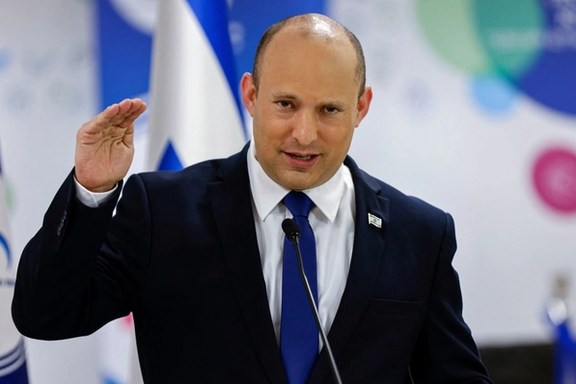
Prime Minister Naftali Bennett claimed Monday that United States President Joe Biden had accepted Israel’s “freedom to act” against Iran even in the event of a renewed nuclear agreement.
Bennett made the remarks a day after the two leaders spoke on the phone at length.“President Biden conveyed his unwavering support for Israel’s security and freedom of action, emphasizing his administration’s full support for replenishing Israel’s Iron Dome system,” said the White House readout of the call. Iron Dome is a surface-to-air defense against short-range missiles and shells.
Bennett portrayed US assurances as far wider. “I was happy that he (Biden) clarified explicitly that Israel will maintain its freedom to act in any situation, which is true, whether or not there is a deal... It’s important in relation to Iran.”
Israeli governments have opposed the 2015 nuclear agreement, the JCPOA, and have supported US ‘maximum pressure’ sanctions.
With Vienna talks due to restart this week, Israel's national security advisor Eyal Hulata said Monday the “danger in returning to the nuclear deal and losing the tools for the US to force a ‘longer and stronger’ agreement, as the Americans call it,” was “imminent.”
Hulata, a former head of external intelligence agency Mossad due in Washington Tuesday to meet US national security advisor Jake Sullivan, said Israel needed to “prepare for every scenario, whether there is a return to the [nuclear] agreement or not”.
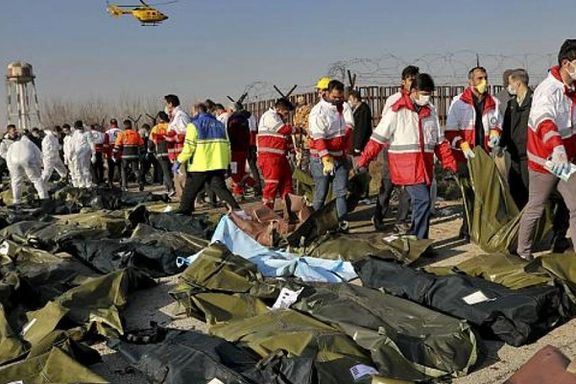
Some parents of those killed in Iran’s downing of Ukrainian Airlines Flight PS752 in January 2020 have rejected compensation offered them.
In a letter to Rostam Ghasemi, the minister of roads and urban development, published Monday, 39 parents said they instead wanted “justice.” They urged the authorities to end their “lies and cruel behavior” and “psychological pressure on the bereaved families” following the shooting down of the airliner.
The letter said any compensation – a figure of $150,000 was cited last month – was worthless, and called for “the main perpetrators including the masterminds, planners and approvers” to be “handed over” and brought “to justice.” Signatories demanded the release to bereaved families closed-circuit video footagefrom the Imam Khomeini International Airport on the day the flight took off.
Dismissing Iran’s claim that the disaster resulted from the malalignment of a mobile missile defense battery, at a time when a United States strike was feared, the parents wrote that “paying compensation before the facts are clarified, a fair trial is held, and the perpetrators of this crime are punished is nothing but hush money.”
All 176 passengers and crew on the plane died in the disaster. Some relatives of victims have described the firing of the missies as a “premeditated act.” A report from the Canadian government, which had many nationals on the place, found in 2021 that the action was “reckless” but not premeditated.
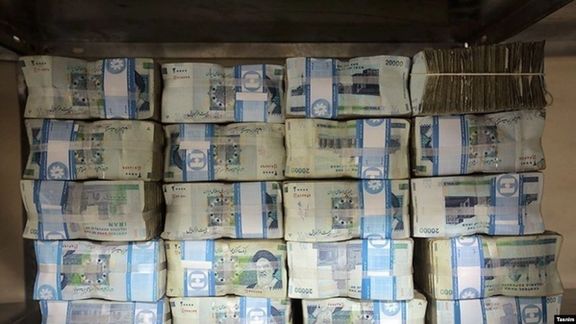
Liquidity in Iran has increased by $14 billion in the past six months, figures released by the central bank show, keeping annual inflation above 40 percent.
Total liquidity reached 44,270 trillion rials or $177 billion based on the current free-market exchange rate, as the government borrowed and printed money to pay for its needs.
The dangerous growth in liquidity occurred during the first six months of President Ebrahim Raisi’s term, despite his government’s repeated promises to curtail liquidity growth, which has led to four years of high, double-digit inflation.
The negative economic news published on Sunday comes as the government has been claiming a substantial increase in oil and non-oil exports revenues.
Ali Salehabadi, chairman of the Central Bank of Iran (CBI) told local television on Sunday that from March 2021 the government has been able to provide $48.6 billion in foreign currency for imports amid US sanctions on the country’s oil exports and international banking. This amount from March 2020 to March 2021 was $37 billion, Salehabadi said. The boost in allocation of US dollars for imports was more than 30 percent if the figures by the central bank chief are correct.
It is not easy to reconcile the two claims. If Iran earned 30 percent more foreign currency since March, and also printed more money, it means a decision was made to continue the inflationary practice of enlarging liquidity, instead of using the additional foreign currency to fight rising prices.
The annual inflation rate has been hovering above 40 percent for at least a year, with food prices rising at 60 percent annually, creating serious political risks for the Islamic Republic.
The government’s debt to the central bank increased by 3 percent and reached $8 billion, in addition to debts to government-owned and quasi-state banks.
The Raisi government faces a 50-percent budget deficit in the new Iranian year starting March 21 and as parliament grapples with the proposed budget bill it is not clear how the deficit will be addressed. In past years, the government has avoided clear explanations, indicating that printing money was the main source of income.
This is partially to blame for the steep fall in the value of the national currency that has declined almost eightfold since late 2017, from 33,000 rials to the US dollar to 267,000 on Monday.
Iran’s hopes can only rest on a nuclear agreement with the United States, which would lift sanctions on its oil exports and international banking. But local economists have warned that additional exports will be a partial and temporary cure for an economy that has had no growth in the past decade. Iran would need ten years of annual 8-percent economic growth to return to where it was in 2010 when the United Nations started imposing nuclear sanctions, which were lifted in 2015 after a nuclear agreement was signed.
Former US president Donald Trump withdrew from that accord in 2018 and reimposed American sanctions.
Although Iran has increased its sanction-busting oil exports in the past one year, primarily to China, it is not clear how much cash revenue it gets. Chinese are willing to buy heavily discounted oil but it is not clear if they are willing to pay in cash through banks in violation of US banking sanctions.
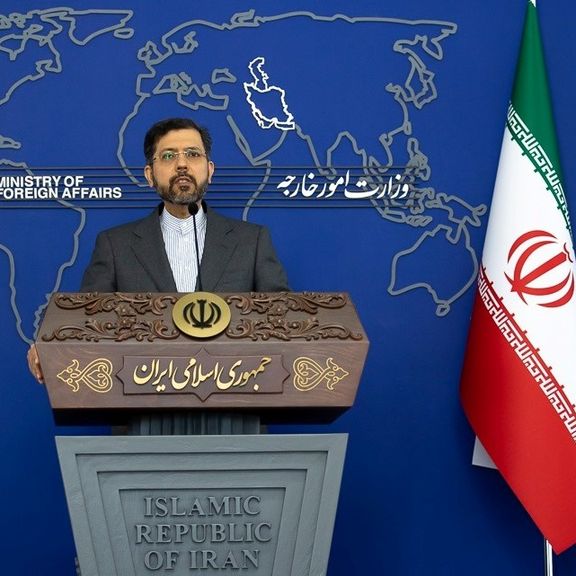
Iran has criticized the United Kingdom over the ‘Iran Atrocities Tribunal,’ which held a second round of sessions in London last week.
At his press conference Monday, Iranian Foreign Ministry spokesman Saeed Khatibzadeh said Tehran had expressed “serious protests” to the UK over London acting as a “hub” for foreign media hostile to Iran.
The spokesman said the tribunal, which is meeting with selected media, was a “theatrical show.”
The tribunal − also known as Aban Tribunal after the Iranian calendar month of Aban of 2019 protests over fuel increases −sat from Friday to Sunday. It has ‘indicted’ 160 Iranian officials with “crimes against humanity.”
But while the tribunals’ ‘verdicts’ are symbolic, some organizers have said a file has been sent to the International Criminal Court and have called for international sanctions against named individuals.
When in London to meet British officials in November, deputy Iranian foreign minister Ali Bagheri-Kani said the tribunal’s activities in London could jeopardize progress in Vienna, where he leads Iranian negotiators meeting world powers, including the UK, trying to revive the 2015 international agreement limiting Tehran’s nuclear program.
During the November 2019 protests, following a fuel price increase designed to ease a fiscal deficit, Amnesty International documented the killing by security forces of over 300 people.